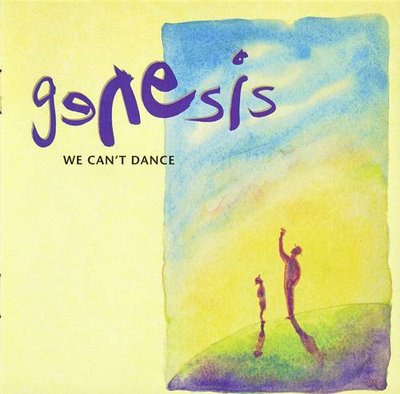
We Can't Dance (1991)

1.No Son of Mine
2.Jesus He Knows Me
3.Driving the Last Spike
4.I Can't Dance
5.Never A Time
6.Dreaming While You Sleep
7.Tell Me Why
8.Living Forever
9.Hold On My Heart
10.Way of the World
11.Since I Lost You
12.Fading Lights
Five years is a long time between albums—particularly in the world of pop music, where tastes evolve faster than release schedules. But by 1991, Genesis were no longer obliged to play by conventional rules. Each member had branched into solo success or side projects, and expectations were, if anything, diffuse. What arrived after this hiatus was not only surprising in its ambition, but arguably the most complete and carefully balanced work the band ever delivered. In a career punctuated by sonic reinvention, We Can’t Dance stands as a quiet triumph—subtle, sprawling, and at times, disarmingly profound.
It’s worth remembering the context. In 1986, albums were still being sculpted to fit the time limitations of vinyl. By the dawn of the new decade, the CD era had truly arrived, and Genesis took full advantage, delivering over seventy minutes of material—more music than they had ever previously attempted on a single release. Remarkably, very little of it feels extraneous. While no album is entirely free from moments of indulgence, the filler here is mercifully minimal.
The record appears to be aimed at two divergent camps within the fanbase: the radio-friendly converts who arrived during the Invisible Touch years, and the long-standing faithful who still clung to the band’s progressive pedigree. In an impressive feat of balance, We Can’t Dance manages to court both without alienating either.
No Son of Mine, the lead single, sets the tone admirably—a brooding, muscular track with echoes of Mama and Abacab, but layered with a seriousness of purpose that feels entirely new. Its social commentary is understated but effective, delivered with Collins’ characteristic conviction. The follow-up single, I Can’t Dance, seems to mock the very culture it so successfully infiltrated—its bone-dry humor and skeletal blues riff a playful jab at commercialism, blue jeans, and pop video posturing.
Elsewhere, the hits keep coming. Jesus He Knows Me and Never a Time lean closer to the Genesis-by-numbers mold—polished, melodic, and radio-primed—but it’s hard to fault songs that do what they intend so efficiently. Hold on My Heart, meanwhile, might be mistaken for a Collins solo ballad, but its delicacy is hard to resist, and it boasts one of the finest vocal performances of his career.
Then come the deeper cuts, and it’s here that We Can’t Dance earns its place among the band’s finest works. Driving the Last Spike—a ten-minute epic chronicling the perils of 19th-century railway laborers—is masterfully paced, historically informed, and musically compelling. Dreaming While You Sleep allows Collins to revisit his roots as a drummer with a dynamic arrangement that unfolds gradually and rewardingly. Living Forever begins as a modest pop ditty before morphing into a lively jam session—an unexpected delight and possibly the album’s most underrated track.
The mood darkens with Since I Lost You, a heartbreakingly restrained elegy written in response to Eric Clapton’s personal tragedy. Its understated beauty lies in its sincerity. And then comes Fading Lights, the finale. Clocking in at over ten minutes, it revisits motifs from Duke’s Travels and Afterglow while also serving as a poignant summation—wistful, expansive, and profoundly moving. In hindsight, it reads like a farewell. No one knew it at the time, but this would be Phil Collins’ final studio album with Genesis. As exits go, it was pitch-perfect.
There are a few stumbles. Tell Me Why strays into the preachy, wide-eyed protest territory with mixed results. Way of the World suffers a similar fate, though its musical sophistication helps redeem the message. These are minor blemishes on an otherwise meticulously crafted canvas.
We Can’t Dance is, in many respects, the last great Genesis album. It straddles eras, pleases crowds, and offers depth for those willing to dig. As the curtain fell on this chapter of the band’s long, strange journey, they exited not with a bang or a whimper—but with grace, reflection, and one final act of quiet brilliance.
Go back to the main page
Go To Next Review